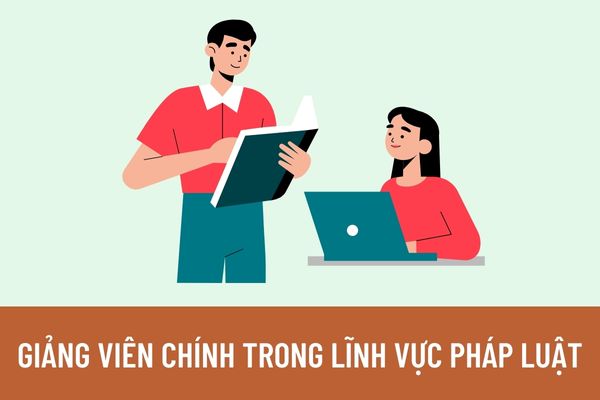Do individuals currently serving as Senior Lecturers in the field of law need to undergo an apprenticeship to become lawyers?
Does an individual currently a Senior Lecturer in the field of law need to undergo a lawyer apprenticeship to become a lawyer?
Based on Clause 4, Article 13 of the 2006 Law on Lawyers stipulates cases where individuals are exempted from legal practice training as follows:
Persons exempt from legal practice training
1. Judges, Procurators, Investigators.
2. Professors, Associate Professors of law; Doctors of law.
3. Senior Inspectors in the Court sector, Senior Inspectors in the Procuracy sector; Senior Specialists, Senior Researchers, Senior Lecturers in the field of law.
4. Principal Inspectors in the Court sector, Principal Inspectors in the Procuracy sector; Principal Specialists, Principal Researchers, Principal Lecturers in the field of law.
Principal Lecturers in the field of law will be exempt from legal practice training, and at the same time, the apprenticeship period for practicing law will be reduced. Specifically:
Based on Article 16 of the 2006 Law on Lawyers (amended by Clause 7, Article 1 of the 2012 Amended Law on Lawyers), it is stipulated as follows:
Persons exempt from or reduced in the lawyer apprenticeship period
1. Persons who have been judges, senior procurators, senior investigators, intermediate investigators, professors, associate professors of law, doctors of law, senior inspectors in the Court sector, senior inspectors in the Procuracy sector, senior specialists, senior researchers, senior lecturers in the field of law are exempt from the lawyer apprenticeship period.
2. Persons who have been elementary investigators, principal inspectors in the Court sector, principal inspectors in the Procuracy sector, principal specialists, principal researchers, principal lecturers in the field of law are granted a two-thirds reduction in the lawyer apprenticeship period.
3. Persons with ten or more years of service in specialist, research, or lecturing positions in the field of law, court inspection, or prosecution inspection are granted a half reduction in the lawyer apprenticeship period.
Thus, individuals currently serving as Principal Lecturers in the field of law with a work period of 10 years or more are granted a half reduction in the lawyer apprenticeship period.

Does an individual currently a Senior Lecturer in the field of law need to undergo a lawyer apprenticeship to become a lawyer?
What documents are required to prove exemption from legal practice training?
Based on Article 4 of Circular 05/2021/TT-BTP stipulates that documents proving exemption from legal practice training according to Article 13 of the Law on Lawyers, or exemption and reduction in the lawyer apprenticeship period according to Article 16 of the 2006 Law on Lawyers include one of the following documents:
- A copy of the decision of appointment, reappointment of judges, procurators, investigators, or the resolution of the People's Council, the minutes of election of judges of the People's Council for judges elected by the district or provincial People's Council.
- A copy of the decision conferring titles of Professor, Associate Professor of law, or a copy of the doctoral law degree.
- A copy of the decision of appointment, reappointment as senior inspector of the Court sector, senior inspector of the Procuracy sector, principal inspector of the Court sector, principal inspector of the Procuracy sector, or the decision of appointment as senior specialist, senior researcher, senior lecturer, principal specialist, principal researcher, principal lecturer in the field of law.
- A copy of the recruitment decision, employment contract in the field of law.
- Other legal documents proving exemption from legal practice training, exemption or reduction in the lawyer apprenticeship period.
Is legal training abroad recognized in Vietnam?
According to Article 3 of Circular 05/2021/TT-BTP, the regulations on recognizing legal training abroad are as follows:
Recognition of legal training abroad
1. Certificates of completion of legal training programs abroad are recognized in the following cases:
a) Certificates of completion of legal training programs abroad issued by foreign training institutions subject to the application of agreements, arrangements on diploma equivalence or mutual recognition, or relevant international treaties on diplomas to which the Socialist Republic of Vietnam is a signatory;
b) Certificates of completion of legal training programs abroad issued by training institutions whose training programs are accredited by quality control agencies of that country, or by competent authorities of that country with permission to establish and authorize the issuance of diplomas, certificates, or graduation certificates for legal training abroad.
2. Persons who have completed legal training programs abroad and wish to be recognized in Vietnam shall submit an online application on the Public Service Portal of the Ministry of Justice, through the postal service, or directly at the Ministry of Justice. The application includes:
a) A request for recognition of legal training abroad;
b) A copy of the certificate of completion of legal training programs abroad; documents proving compliance with one of the cases stipulated in clause 1 of this article;
c) A copy of the results of legal training abroad.
Documents stipulated in clauses b and c must be consularly legalized in accordance with the law and translated into Vietnamese; the Vietnamese translation must be notarized or authenticated as per Vietnamese law.
3. Within 15 days from the receipt of a valid application, the Minister of Justice will issue a decision recognizing the legal training abroad; in case of refusal, a written notice clearly stating the reasons must be provided.
Therefore, legal training abroad that meets the above regulations will be recognized in Vietnam.
LawNet
